Agriculture and Sustainable Development: A Libyan Case Study Report
VerifiedAdded on 2022/12/28
|31
|12611
|57
Report
AI Summary
This report provides a comprehensive analysis of agriculture and sustainable development within Libya. It begins by defining sustainable agriculture and its importance, particularly in the context of Libya's challenging climate and limited resources. The report explores the theoretical context, examining the concept of sustainable agriculture and its structure within Libya. It identifies key challenges such as water scarcity, poor soil quality, and the impact of political instability on agricultural practices. The research also investigates the development plans and techniques Libya has adopted to achieve agricultural self-sufficiency, including investments in irrigation projects like the Great Man-Made River. Furthermore, the report discusses strategies the Libyan government could implement to support sustainable agricultural practices, such as promoting polyculture, permaculture, and agroforestry. The research methodology employed is qualitative, utilizing interviews to gather in-depth data. The report concludes by emphasizing the potential of sustainable farming practices to improve Libya's agricultural productivity and enhance its food security, recommending specific techniques like polyculture and agroforestry to address the challenges of desertification and ensure long-term sustainability.
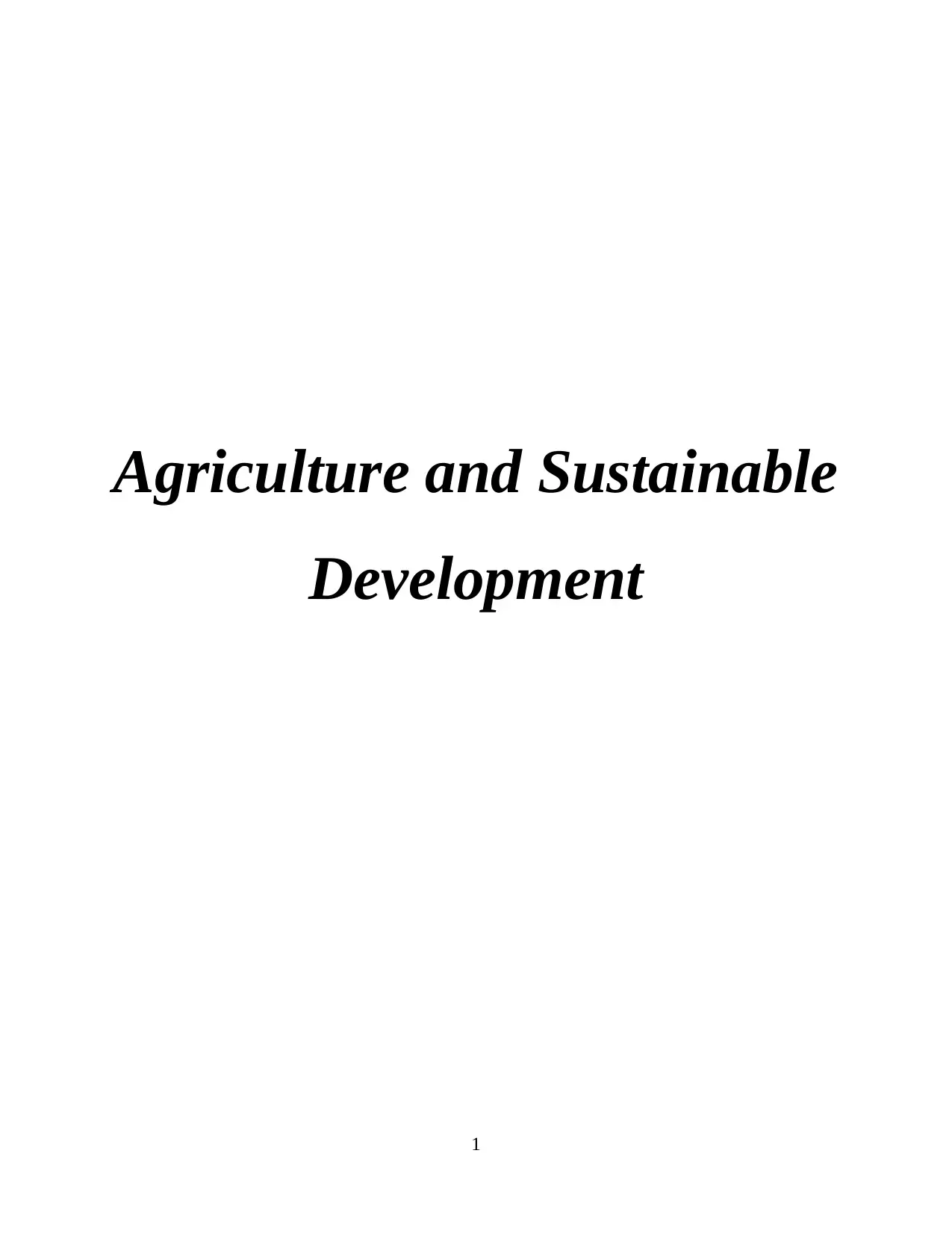
Agriculture and Sustainable
Development
1
Development
1
Paraphrase This Document
Need a fresh take? Get an instant paraphrase of this document with our AI Paraphraser
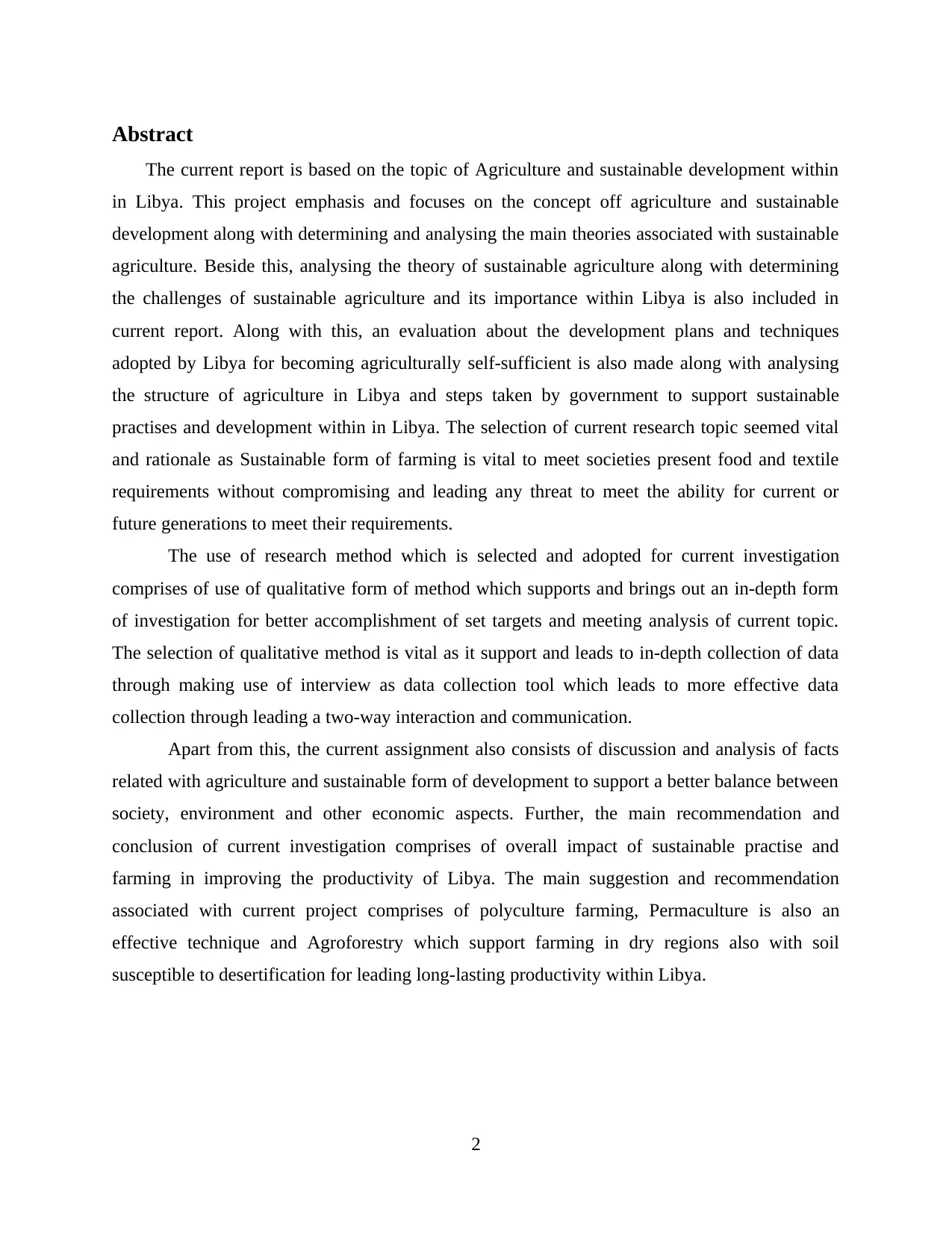
Abstract
The current report is based on the topic of Agriculture and sustainable development within
in Libya. This project emphasis and focuses on the concept off agriculture and sustainable
development along with determining and analysing the main theories associated with sustainable
agriculture. Beside this, analysing the theory of sustainable agriculture along with determining
the challenges of sustainable agriculture and its importance within Libya is also included in
current report. Along with this, an evaluation about the development plans and techniques
adopted by Libya for becoming agriculturally self-sufficient is also made along with analysing
the structure of agriculture in Libya and steps taken by government to support sustainable
practises and development within in Libya. The selection of current research topic seemed vital
and rationale as Sustainable form of farming is vital to meet societies present food and textile
requirements without compromising and leading any threat to meet the ability for current or
future generations to meet their requirements.
The use of research method which is selected and adopted for current investigation
comprises of use of qualitative form of method which supports and brings out an in-depth form
of investigation for better accomplishment of set targets and meeting analysis of current topic.
The selection of qualitative method is vital as it support and leads to in-depth collection of data
through making use of interview as data collection tool which leads to more effective data
collection through leading a two-way interaction and communication.
Apart from this, the current assignment also consists of discussion and analysis of facts
related with agriculture and sustainable form of development to support a better balance between
society, environment and other economic aspects. Further, the main recommendation and
conclusion of current investigation comprises of overall impact of sustainable practise and
farming in improving the productivity of Libya. The main suggestion and recommendation
associated with current project comprises of polyculture farming, Permaculture is also an
effective technique and Agroforestry which support farming in dry regions also with soil
susceptible to desertification for leading long-lasting productivity within Libya.
2
The current report is based on the topic of Agriculture and sustainable development within
in Libya. This project emphasis and focuses on the concept off agriculture and sustainable
development along with determining and analysing the main theories associated with sustainable
agriculture. Beside this, analysing the theory of sustainable agriculture along with determining
the challenges of sustainable agriculture and its importance within Libya is also included in
current report. Along with this, an evaluation about the development plans and techniques
adopted by Libya for becoming agriculturally self-sufficient is also made along with analysing
the structure of agriculture in Libya and steps taken by government to support sustainable
practises and development within in Libya. The selection of current research topic seemed vital
and rationale as Sustainable form of farming is vital to meet societies present food and textile
requirements without compromising and leading any threat to meet the ability for current or
future generations to meet their requirements.
The use of research method which is selected and adopted for current investigation
comprises of use of qualitative form of method which supports and brings out an in-depth form
of investigation for better accomplishment of set targets and meeting analysis of current topic.
The selection of qualitative method is vital as it support and leads to in-depth collection of data
through making use of interview as data collection tool which leads to more effective data
collection through leading a two-way interaction and communication.
Apart from this, the current assignment also consists of discussion and analysis of facts
related with agriculture and sustainable form of development to support a better balance between
society, environment and other economic aspects. Further, the main recommendation and
conclusion of current investigation comprises of overall impact of sustainable practise and
farming in improving the productivity of Libya. The main suggestion and recommendation
associated with current project comprises of polyculture farming, Permaculture is also an
effective technique and Agroforestry which support farming in dry regions also with soil
susceptible to desertification for leading long-lasting productivity within Libya.
2
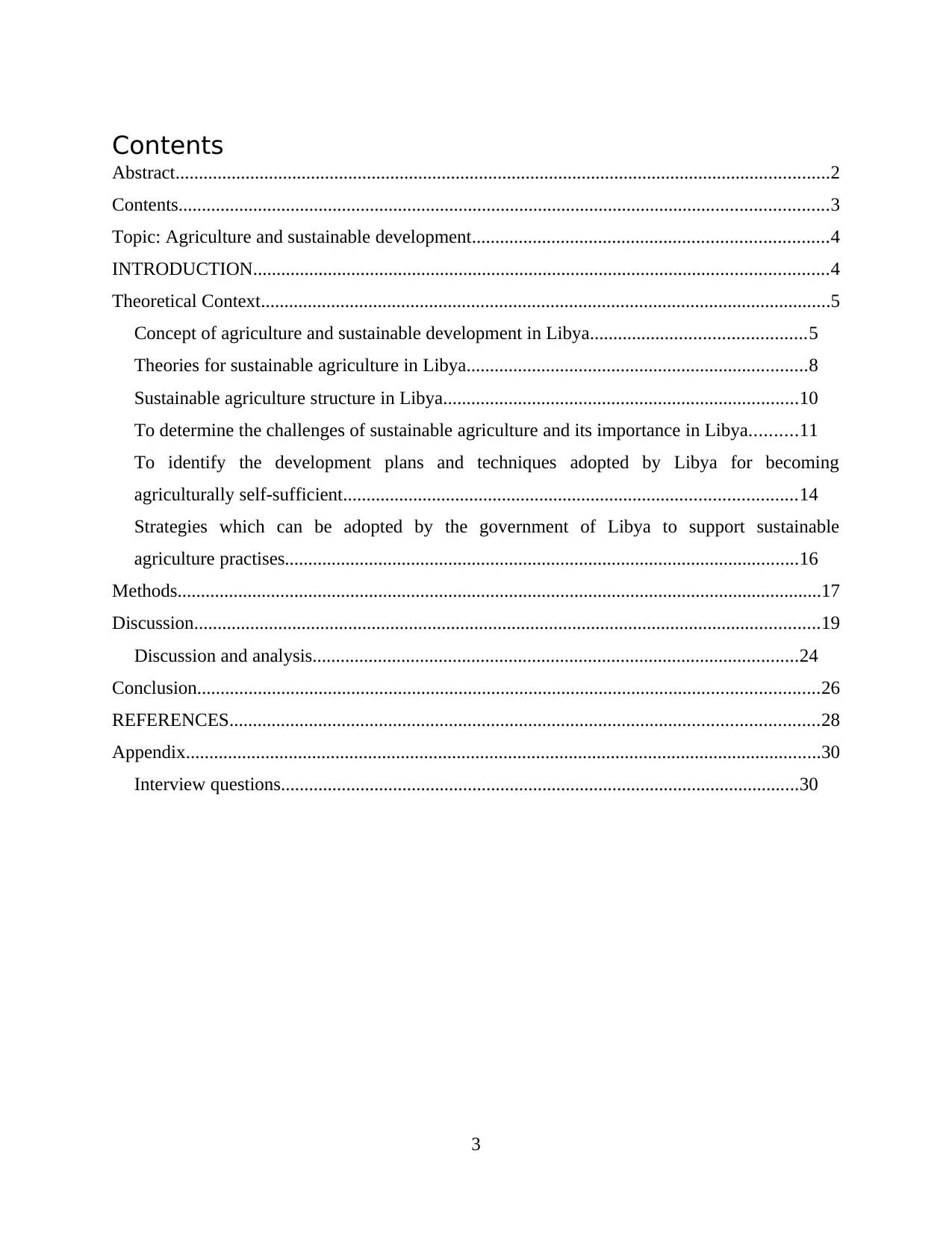
Contents
Abstract............................................................................................................................................2
Contents...........................................................................................................................................3
Topic: Agriculture and sustainable development............................................................................4
INTRODUCTION...........................................................................................................................4
Theoretical Context..........................................................................................................................5
Concept of agriculture and sustainable development in Libya..............................................5
Theories for sustainable agriculture in Libya.........................................................................8
Sustainable agriculture structure in Libya............................................................................10
To determine the challenges of sustainable agriculture and its importance in Libya..........11
To identify the development plans and techniques adopted by Libya for becoming
agriculturally self-sufficient.................................................................................................14
Strategies which can be adopted by the government of Libya to support sustainable
agriculture practises..............................................................................................................16
Methods..........................................................................................................................................17
Discussion......................................................................................................................................19
Discussion and analysis........................................................................................................24
Conclusion.....................................................................................................................................26
REFERENCES..............................................................................................................................28
Appendix........................................................................................................................................30
Interview questions...............................................................................................................30
3
Abstract............................................................................................................................................2
Contents...........................................................................................................................................3
Topic: Agriculture and sustainable development............................................................................4
INTRODUCTION...........................................................................................................................4
Theoretical Context..........................................................................................................................5
Concept of agriculture and sustainable development in Libya..............................................5
Theories for sustainable agriculture in Libya.........................................................................8
Sustainable agriculture structure in Libya............................................................................10
To determine the challenges of sustainable agriculture and its importance in Libya..........11
To identify the development plans and techniques adopted by Libya for becoming
agriculturally self-sufficient.................................................................................................14
Strategies which can be adopted by the government of Libya to support sustainable
agriculture practises..............................................................................................................16
Methods..........................................................................................................................................17
Discussion......................................................................................................................................19
Discussion and analysis........................................................................................................24
Conclusion.....................................................................................................................................26
REFERENCES..............................................................................................................................28
Appendix........................................................................................................................................30
Interview questions...............................................................................................................30
3
⊘ This is a preview!⊘
Do you want full access?
Subscribe today to unlock all pages.

Trusted by 1+ million students worldwide
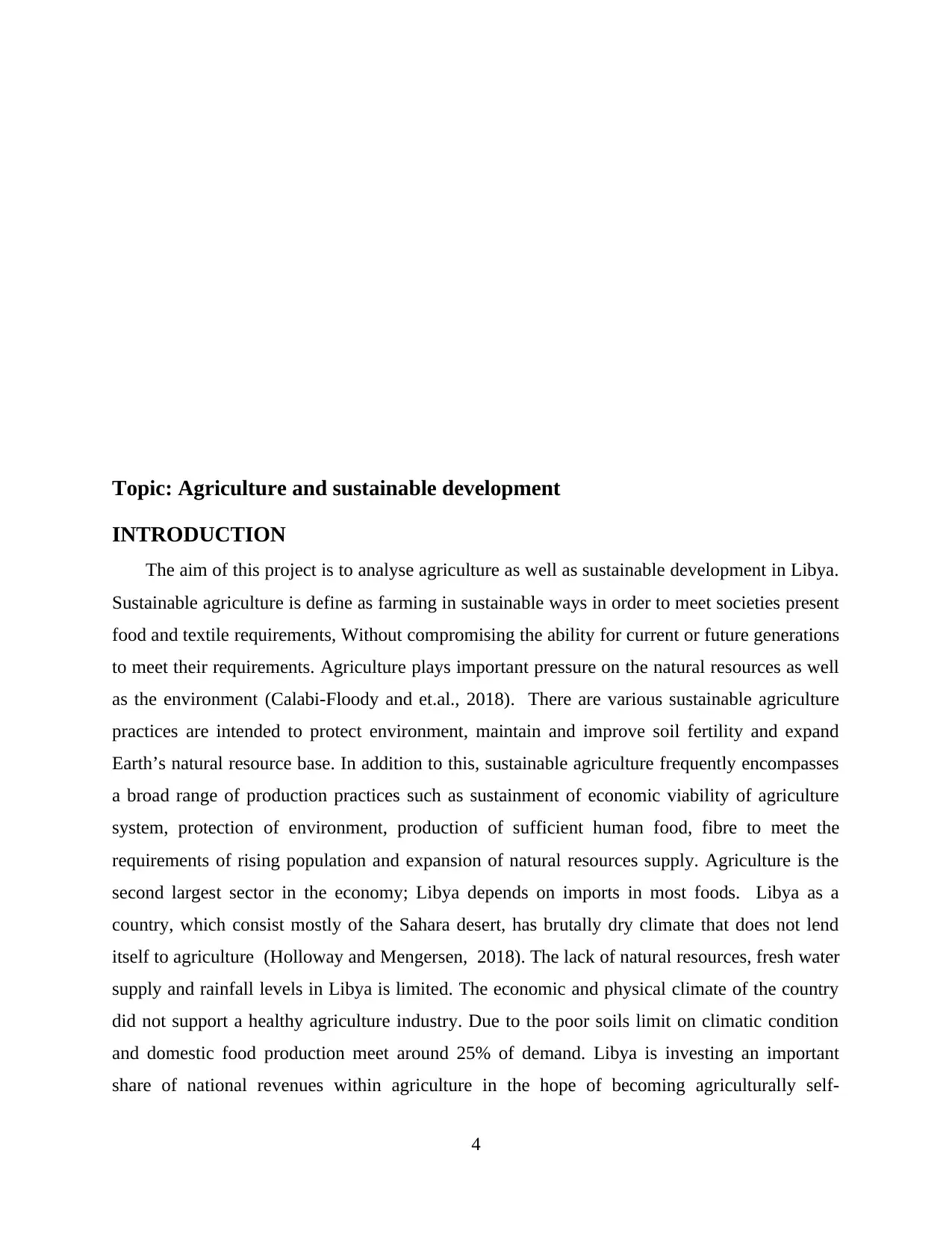
Topic: Agriculture and sustainable development
INTRODUCTION
The aim of this project is to analyse agriculture as well as sustainable development in Libya.
Sustainable agriculture is define as farming in sustainable ways in order to meet societies present
food and textile requirements, Without compromising the ability for current or future generations
to meet their requirements. Agriculture plays important pressure on the natural resources as well
as the environment (Calabi-Floody and et.al., 2018). There are various sustainable agriculture
practices are intended to protect environment, maintain and improve soil fertility and expand
Earth’s natural resource base. In addition to this, sustainable agriculture frequently encompasses
a broad range of production practices such as sustainment of economic viability of agriculture
system, protection of environment, production of sufficient human food, fibre to meet the
requirements of rising population and expansion of natural resources supply. Agriculture is the
second largest sector in the economy; Libya depends on imports in most foods. Libya as a
country, which consist mostly of the Sahara desert, has brutally dry climate that does not lend
itself to agriculture (Holloway and Mengersen, 2018). The lack of natural resources, fresh water
supply and rainfall levels in Libya is limited. The economic and physical climate of the country
did not support a healthy agriculture industry. Due to the poor soils limit on climatic condition
and domestic food production meet around 25% of demand. Libya is investing an important
share of national revenues within agriculture in the hope of becoming agriculturally self-
4
INTRODUCTION
The aim of this project is to analyse agriculture as well as sustainable development in Libya.
Sustainable agriculture is define as farming in sustainable ways in order to meet societies present
food and textile requirements, Without compromising the ability for current or future generations
to meet their requirements. Agriculture plays important pressure on the natural resources as well
as the environment (Calabi-Floody and et.al., 2018). There are various sustainable agriculture
practices are intended to protect environment, maintain and improve soil fertility and expand
Earth’s natural resource base. In addition to this, sustainable agriculture frequently encompasses
a broad range of production practices such as sustainment of economic viability of agriculture
system, protection of environment, production of sufficient human food, fibre to meet the
requirements of rising population and expansion of natural resources supply. Agriculture is the
second largest sector in the economy; Libya depends on imports in most foods. Libya as a
country, which consist mostly of the Sahara desert, has brutally dry climate that does not lend
itself to agriculture (Holloway and Mengersen, 2018). The lack of natural resources, fresh water
supply and rainfall levels in Libya is limited. The economic and physical climate of the country
did not support a healthy agriculture industry. Due to the poor soils limit on climatic condition
and domestic food production meet around 25% of demand. Libya is investing an important
share of national revenues within agriculture in the hope of becoming agriculturally self-
4
Paraphrase This Document
Need a fresh take? Get an instant paraphrase of this document with our AI Paraphraser
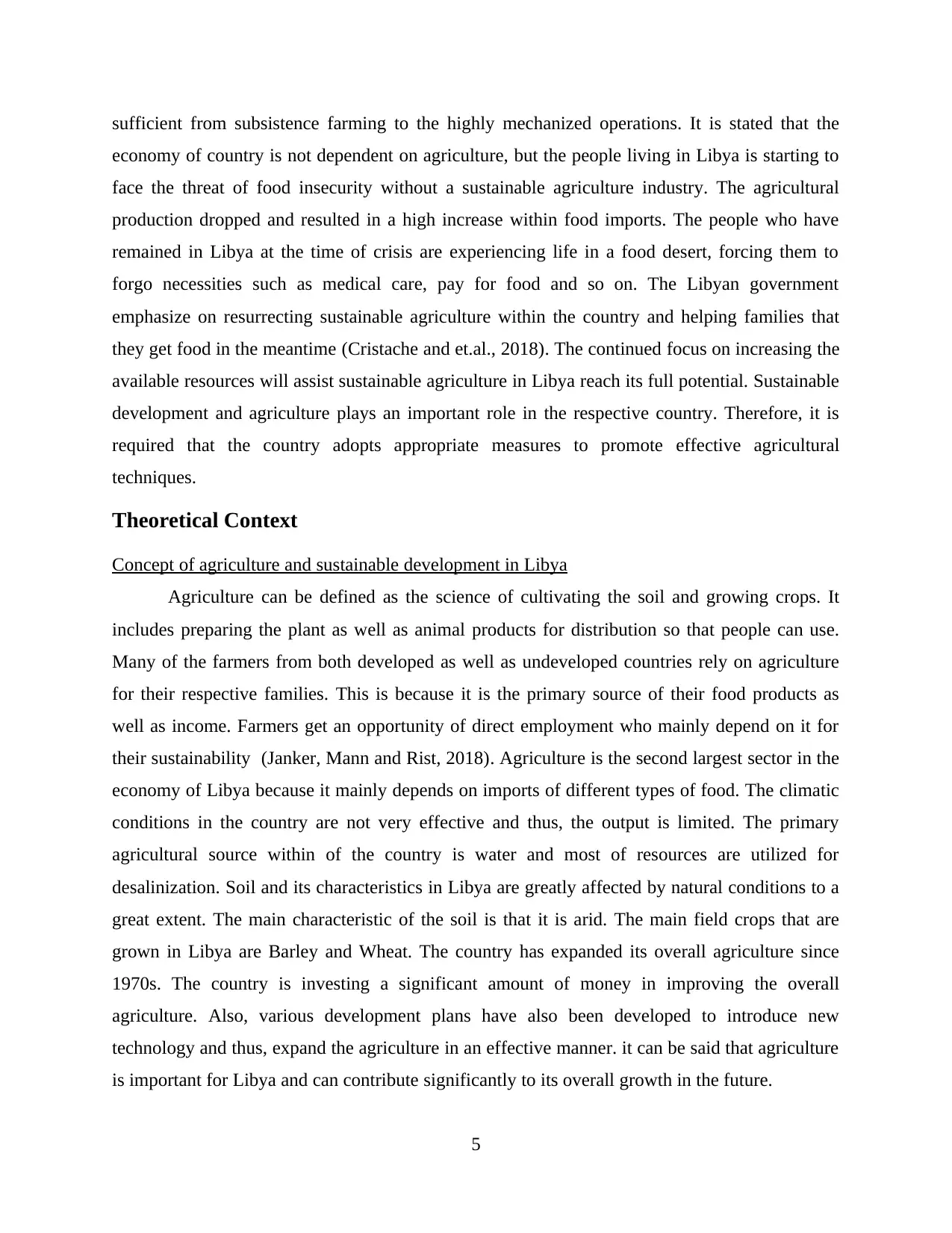
sufficient from subsistence farming to the highly mechanized operations. It is stated that the
economy of country is not dependent on agriculture, but the people living in Libya is starting to
face the threat of food insecurity without a sustainable agriculture industry. The agricultural
production dropped and resulted in a high increase within food imports. The people who have
remained in Libya at the time of crisis are experiencing life in a food desert, forcing them to
forgo necessities such as medical care, pay for food and so on. The Libyan government
emphasize on resurrecting sustainable agriculture within the country and helping families that
they get food in the meantime (Cristache and et.al., 2018). The continued focus on increasing the
available resources will assist sustainable agriculture in Libya reach its full potential. Sustainable
development and agriculture plays an important role in the respective country. Therefore, it is
required that the country adopts appropriate measures to promote effective agricultural
techniques.
Theoretical Context
Concept of agriculture and sustainable development in Libya
Agriculture can be defined as the science of cultivating the soil and growing crops. It
includes preparing the plant as well as animal products for distribution so that people can use.
Many of the farmers from both developed as well as undeveloped countries rely on agriculture
for their respective families. This is because it is the primary source of their food products as
well as income. Farmers get an opportunity of direct employment who mainly depend on it for
their sustainability (Janker, Mann and Rist, 2018). Agriculture is the second largest sector in the
economy of Libya because it mainly depends on imports of different types of food. The climatic
conditions in the country are not very effective and thus, the output is limited. The primary
agricultural source within of the country is water and most of resources are utilized for
desalinization. Soil and its characteristics in Libya are greatly affected by natural conditions to a
great extent. The main characteristic of the soil is that it is arid. The main field crops that are
grown in Libya are Barley and Wheat. The country has expanded its overall agriculture since
1970s. The country is investing a significant amount of money in improving the overall
agriculture. Also, various development plans have also been developed to introduce new
technology and thus, expand the agriculture in an effective manner. it can be said that agriculture
is important for Libya and can contribute significantly to its overall growth in the future.
5
economy of country is not dependent on agriculture, but the people living in Libya is starting to
face the threat of food insecurity without a sustainable agriculture industry. The agricultural
production dropped and resulted in a high increase within food imports. The people who have
remained in Libya at the time of crisis are experiencing life in a food desert, forcing them to
forgo necessities such as medical care, pay for food and so on. The Libyan government
emphasize on resurrecting sustainable agriculture within the country and helping families that
they get food in the meantime (Cristache and et.al., 2018). The continued focus on increasing the
available resources will assist sustainable agriculture in Libya reach its full potential. Sustainable
development and agriculture plays an important role in the respective country. Therefore, it is
required that the country adopts appropriate measures to promote effective agricultural
techniques.
Theoretical Context
Concept of agriculture and sustainable development in Libya
Agriculture can be defined as the science of cultivating the soil and growing crops. It
includes preparing the plant as well as animal products for distribution so that people can use.
Many of the farmers from both developed as well as undeveloped countries rely on agriculture
for their respective families. This is because it is the primary source of their food products as
well as income. Farmers get an opportunity of direct employment who mainly depend on it for
their sustainability (Janker, Mann and Rist, 2018). Agriculture is the second largest sector in the
economy of Libya because it mainly depends on imports of different types of food. The climatic
conditions in the country are not very effective and thus, the output is limited. The primary
agricultural source within of the country is water and most of resources are utilized for
desalinization. Soil and its characteristics in Libya are greatly affected by natural conditions to a
great extent. The main characteristic of the soil is that it is arid. The main field crops that are
grown in Libya are Barley and Wheat. The country has expanded its overall agriculture since
1970s. The country is investing a significant amount of money in improving the overall
agriculture. Also, various development plans have also been developed to introduce new
technology and thus, expand the agriculture in an effective manner. it can be said that agriculture
is important for Libya and can contribute significantly to its overall growth in the future.
5
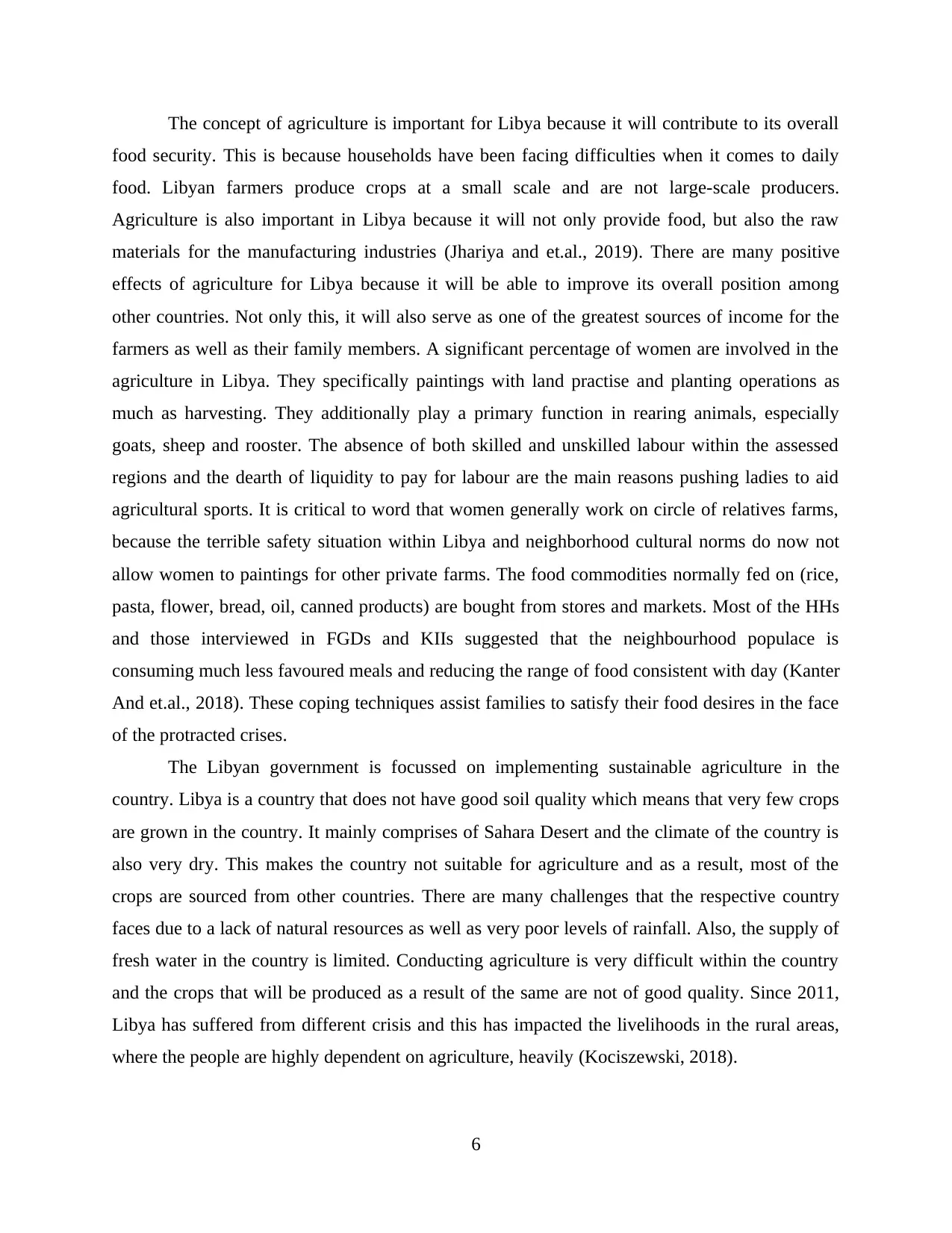
The concept of agriculture is important for Libya because it will contribute to its overall
food security. This is because households have been facing difficulties when it comes to daily
food. Libyan farmers produce crops at a small scale and are not large-scale producers.
Agriculture is also important in Libya because it will not only provide food, but also the raw
materials for the manufacturing industries (Jhariya and et.al., 2019). There are many positive
effects of agriculture for Libya because it will be able to improve its overall position among
other countries. Not only this, it will also serve as one of the greatest sources of income for the
farmers as well as their family members. A significant percentage of women are involved in the
agriculture in Libya. They specifically paintings with land practise and planting operations as
much as harvesting. They additionally play a primary function in rearing animals, especially
goats, sheep and rooster. The absence of both skilled and unskilled labour within the assessed
regions and the dearth of liquidity to pay for labour are the main reasons pushing ladies to aid
agricultural sports. It is critical to word that women generally work on circle of relatives farms,
because the terrible safety situation within Libya and neighborhood cultural norms do now not
allow women to paintings for other private farms. The food commodities normally fed on (rice,
pasta, flower, bread, oil, canned products) are bought from stores and markets. Most of the HHs
and those interviewed in FGDs and KIIs suggested that the neighbourhood populace is
consuming much less favoured meals and reducing the range of food consistent with day (Kanter
And et.al., 2018). These coping techniques assist families to satisfy their food desires in the face
of the protracted crises.
The Libyan government is focussed on implementing sustainable agriculture in the
country. Libya is a country that does not have good soil quality which means that very few crops
are grown in the country. It mainly comprises of Sahara Desert and the climate of the country is
also very dry. This makes the country not suitable for agriculture and as a result, most of the
crops are sourced from other countries. There are many challenges that the respective country
faces due to a lack of natural resources as well as very poor levels of rainfall. Also, the supply of
fresh water in the country is limited. Conducting agriculture is very difficult within the country
and the crops that will be produced as a result of the same are not of good quality. Since 2011,
Libya has suffered from different crisis and this has impacted the livelihoods in the rural areas,
where the people are highly dependent on agriculture, heavily (Kociszewski, 2018).
6
food security. This is because households have been facing difficulties when it comes to daily
food. Libyan farmers produce crops at a small scale and are not large-scale producers.
Agriculture is also important in Libya because it will not only provide food, but also the raw
materials for the manufacturing industries (Jhariya and et.al., 2019). There are many positive
effects of agriculture for Libya because it will be able to improve its overall position among
other countries. Not only this, it will also serve as one of the greatest sources of income for the
farmers as well as their family members. A significant percentage of women are involved in the
agriculture in Libya. They specifically paintings with land practise and planting operations as
much as harvesting. They additionally play a primary function in rearing animals, especially
goats, sheep and rooster. The absence of both skilled and unskilled labour within the assessed
regions and the dearth of liquidity to pay for labour are the main reasons pushing ladies to aid
agricultural sports. It is critical to word that women generally work on circle of relatives farms,
because the terrible safety situation within Libya and neighborhood cultural norms do now not
allow women to paintings for other private farms. The food commodities normally fed on (rice,
pasta, flower, bread, oil, canned products) are bought from stores and markets. Most of the HHs
and those interviewed in FGDs and KIIs suggested that the neighbourhood populace is
consuming much less favoured meals and reducing the range of food consistent with day (Kanter
And et.al., 2018). These coping techniques assist families to satisfy their food desires in the face
of the protracted crises.
The Libyan government is focussed on implementing sustainable agriculture in the
country. Libya is a country that does not have good soil quality which means that very few crops
are grown in the country. It mainly comprises of Sahara Desert and the climate of the country is
also very dry. This makes the country not suitable for agriculture and as a result, most of the
crops are sourced from other countries. There are many challenges that the respective country
faces due to a lack of natural resources as well as very poor levels of rainfall. Also, the supply of
fresh water in the country is limited. Conducting agriculture is very difficult within the country
and the crops that will be produced as a result of the same are not of good quality. Since 2011,
Libya has suffered from different crisis and this has impacted the livelihoods in the rural areas,
where the people are highly dependent on agriculture, heavily (Kociszewski, 2018).
6
⊘ This is a preview!⊘
Do you want full access?
Subscribe today to unlock all pages.

Trusted by 1+ million students worldwide
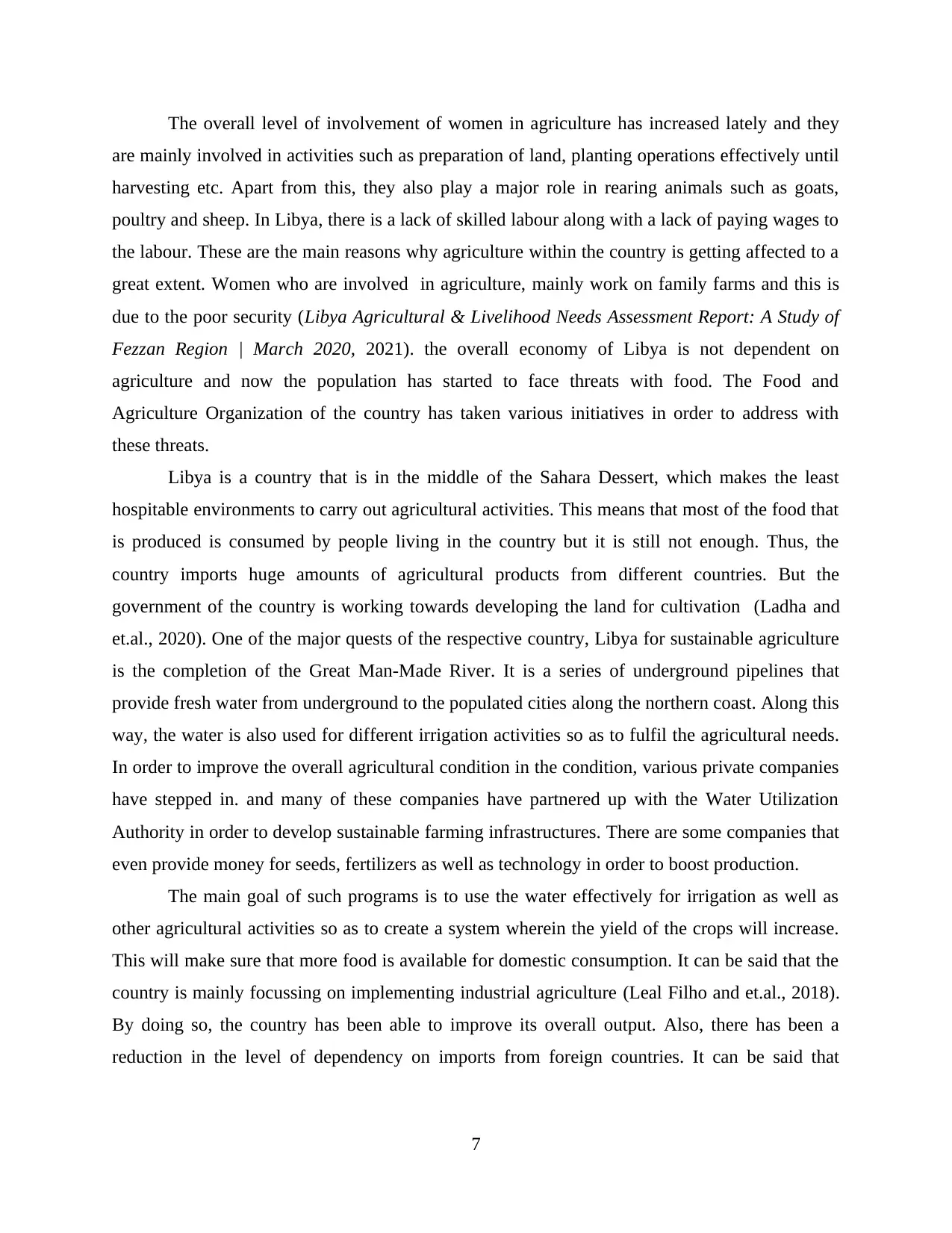
The overall level of involvement of women in agriculture has increased lately and they
are mainly involved in activities such as preparation of land, planting operations effectively until
harvesting etc. Apart from this, they also play a major role in rearing animals such as goats,
poultry and sheep. In Libya, there is a lack of skilled labour along with a lack of paying wages to
the labour. These are the main reasons why agriculture within the country is getting affected to a
great extent. Women who are involved in agriculture, mainly work on family farms and this is
due to the poor security (Libya Agricultural & Livelihood Needs Assessment Report: A Study of
Fezzan Region | March 2020, 2021). the overall economy of Libya is not dependent on
agriculture and now the population has started to face threats with food. The Food and
Agriculture Organization of the country has taken various initiatives in order to address with
these threats.
Libya is a country that is in the middle of the Sahara Dessert, which makes the least
hospitable environments to carry out agricultural activities. This means that most of the food that
is produced is consumed by people living in the country but it is still not enough. Thus, the
country imports huge amounts of agricultural products from different countries. But the
government of the country is working towards developing the land for cultivation (Ladha and
et.al., 2020). One of the major quests of the respective country, Libya for sustainable agriculture
is the completion of the Great Man-Made River. It is a series of underground pipelines that
provide fresh water from underground to the populated cities along the northern coast. Along this
way, the water is also used for different irrigation activities so as to fulfil the agricultural needs.
In order to improve the overall agricultural condition in the condition, various private companies
have stepped in. and many of these companies have partnered up with the Water Utilization
Authority in order to develop sustainable farming infrastructures. There are some companies that
even provide money for seeds, fertilizers as well as technology in order to boost production.
The main goal of such programs is to use the water effectively for irrigation as well as
other agricultural activities so as to create a system wherein the yield of the crops will increase.
This will make sure that more food is available for domestic consumption. It can be said that the
country is mainly focussing on implementing industrial agriculture (Leal Filho and et.al., 2018).
By doing so, the country has been able to improve its overall output. Also, there has been a
reduction in the level of dependency on imports from foreign countries. It can be said that
7
are mainly involved in activities such as preparation of land, planting operations effectively until
harvesting etc. Apart from this, they also play a major role in rearing animals such as goats,
poultry and sheep. In Libya, there is a lack of skilled labour along with a lack of paying wages to
the labour. These are the main reasons why agriculture within the country is getting affected to a
great extent. Women who are involved in agriculture, mainly work on family farms and this is
due to the poor security (Libya Agricultural & Livelihood Needs Assessment Report: A Study of
Fezzan Region | March 2020, 2021). the overall economy of Libya is not dependent on
agriculture and now the population has started to face threats with food. The Food and
Agriculture Organization of the country has taken various initiatives in order to address with
these threats.
Libya is a country that is in the middle of the Sahara Dessert, which makes the least
hospitable environments to carry out agricultural activities. This means that most of the food that
is produced is consumed by people living in the country but it is still not enough. Thus, the
country imports huge amounts of agricultural products from different countries. But the
government of the country is working towards developing the land for cultivation (Ladha and
et.al., 2020). One of the major quests of the respective country, Libya for sustainable agriculture
is the completion of the Great Man-Made River. It is a series of underground pipelines that
provide fresh water from underground to the populated cities along the northern coast. Along this
way, the water is also used for different irrigation activities so as to fulfil the agricultural needs.
In order to improve the overall agricultural condition in the condition, various private companies
have stepped in. and many of these companies have partnered up with the Water Utilization
Authority in order to develop sustainable farming infrastructures. There are some companies that
even provide money for seeds, fertilizers as well as technology in order to boost production.
The main goal of such programs is to use the water effectively for irrigation as well as
other agricultural activities so as to create a system wherein the yield of the crops will increase.
This will make sure that more food is available for domestic consumption. It can be said that the
country is mainly focussing on implementing industrial agriculture (Leal Filho and et.al., 2018).
By doing so, the country has been able to improve its overall output. Also, there has been a
reduction in the level of dependency on imports from foreign countries. It can be said that
7
Paraphrase This Document
Need a fresh take? Get an instant paraphrase of this document with our AI Paraphraser
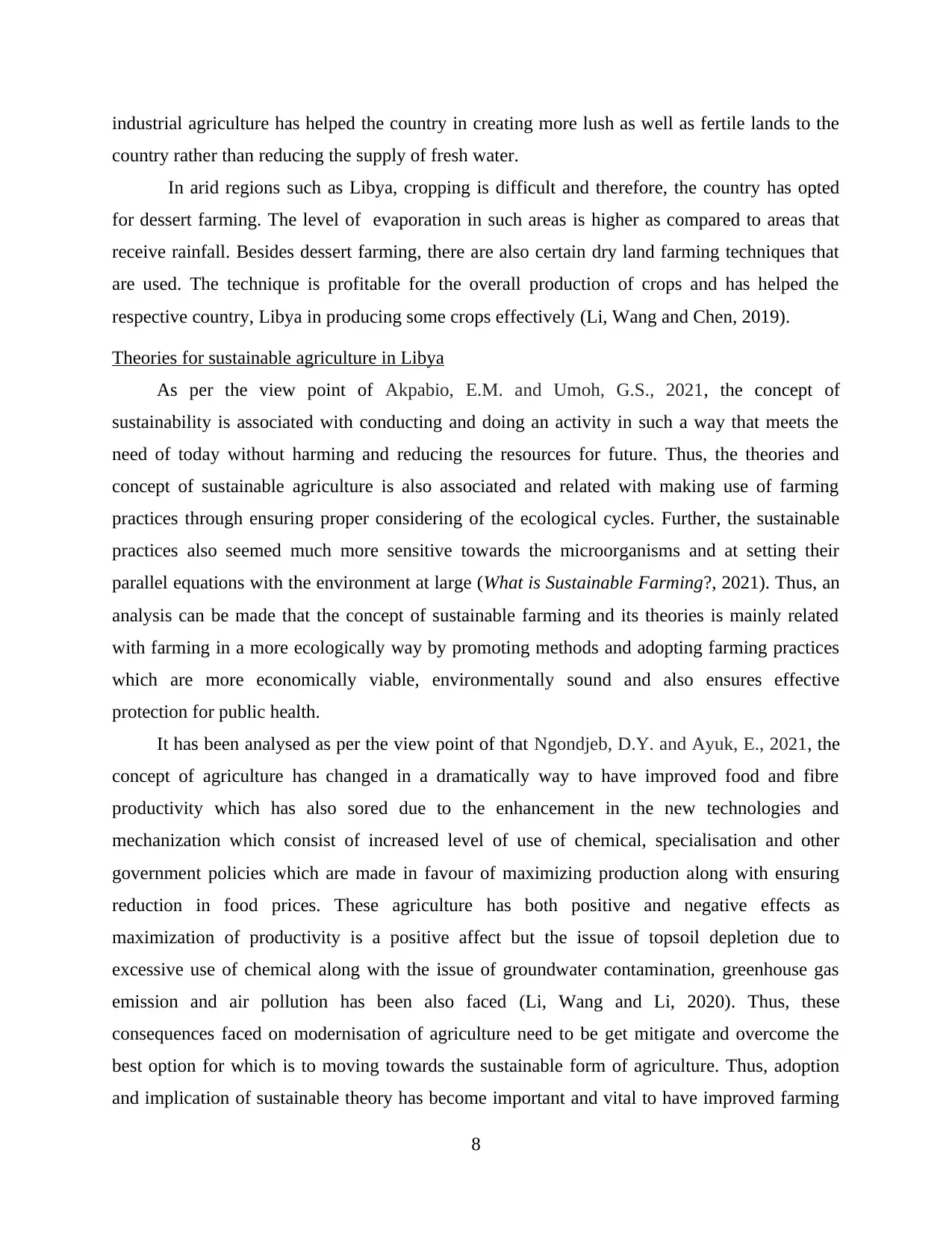
industrial agriculture has helped the country in creating more lush as well as fertile lands to the
country rather than reducing the supply of fresh water.
In arid regions such as Libya, cropping is difficult and therefore, the country has opted
for dessert farming. The level of evaporation in such areas is higher as compared to areas that
receive rainfall. Besides dessert farming, there are also certain dry land farming techniques that
are used. The technique is profitable for the overall production of crops and has helped the
respective country, Libya in producing some crops effectively (Li, Wang and Chen, 2019).
Theories for sustainable agriculture in Libya
As per the view point of Akpabio, E.M. and Umoh, G.S., 2021, the concept of
sustainability is associated with conducting and doing an activity in such a way that meets the
need of today without harming and reducing the resources for future. Thus, the theories and
concept of sustainable agriculture is also associated and related with making use of farming
practices through ensuring proper considering of the ecological cycles. Further, the sustainable
practices also seemed much more sensitive towards the microorganisms and at setting their
parallel equations with the environment at large (What is Sustainable Farming?, 2021). Thus, an
analysis can be made that the concept of sustainable farming and its theories is mainly related
with farming in a more ecologically way by promoting methods and adopting farming practices
which are more economically viable, environmentally sound and also ensures effective
protection for public health.
It has been analysed as per the view point of that Ngondjeb, D.Y. and Ayuk, E., 2021, the
concept of agriculture has changed in a dramatically way to have improved food and fibre
productivity which has also sored due to the enhancement in the new technologies and
mechanization which consist of increased level of use of chemical, specialisation and other
government policies which are made in favour of maximizing production along with ensuring
reduction in food prices. These agriculture has both positive and negative effects as
maximization of productivity is a positive affect but the issue of topsoil depletion due to
excessive use of chemical along with the issue of groundwater contamination, greenhouse gas
emission and air pollution has been also faced (Li, Wang and Li, 2020). Thus, these
consequences faced on modernisation of agriculture need to be get mitigate and overcome the
best option for which is to moving towards the sustainable form of agriculture. Thus, adoption
and implication of sustainable theory has become important and vital to have improved farming
8
country rather than reducing the supply of fresh water.
In arid regions such as Libya, cropping is difficult and therefore, the country has opted
for dessert farming. The level of evaporation in such areas is higher as compared to areas that
receive rainfall. Besides dessert farming, there are also certain dry land farming techniques that
are used. The technique is profitable for the overall production of crops and has helped the
respective country, Libya in producing some crops effectively (Li, Wang and Chen, 2019).
Theories for sustainable agriculture in Libya
As per the view point of Akpabio, E.M. and Umoh, G.S., 2021, the concept of
sustainability is associated with conducting and doing an activity in such a way that meets the
need of today without harming and reducing the resources for future. Thus, the theories and
concept of sustainable agriculture is also associated and related with making use of farming
practices through ensuring proper considering of the ecological cycles. Further, the sustainable
practices also seemed much more sensitive towards the microorganisms and at setting their
parallel equations with the environment at large (What is Sustainable Farming?, 2021). Thus, an
analysis can be made that the concept of sustainable farming and its theories is mainly related
with farming in a more ecologically way by promoting methods and adopting farming practices
which are more economically viable, environmentally sound and also ensures effective
protection for public health.
It has been analysed as per the view point of that Ngondjeb, D.Y. and Ayuk, E., 2021, the
concept of agriculture has changed in a dramatically way to have improved food and fibre
productivity which has also sored due to the enhancement in the new technologies and
mechanization which consist of increased level of use of chemical, specialisation and other
government policies which are made in favour of maximizing production along with ensuring
reduction in food prices. These agriculture has both positive and negative effects as
maximization of productivity is a positive affect but the issue of topsoil depletion due to
excessive use of chemical along with the issue of groundwater contamination, greenhouse gas
emission and air pollution has been also faced (Li, Wang and Li, 2020). Thus, these
consequences faced on modernisation of agriculture need to be get mitigate and overcome the
best option for which is to moving towards the sustainable form of agriculture. Thus, adoption
and implication of sustainable theory has become important and vital to have improved farming
8
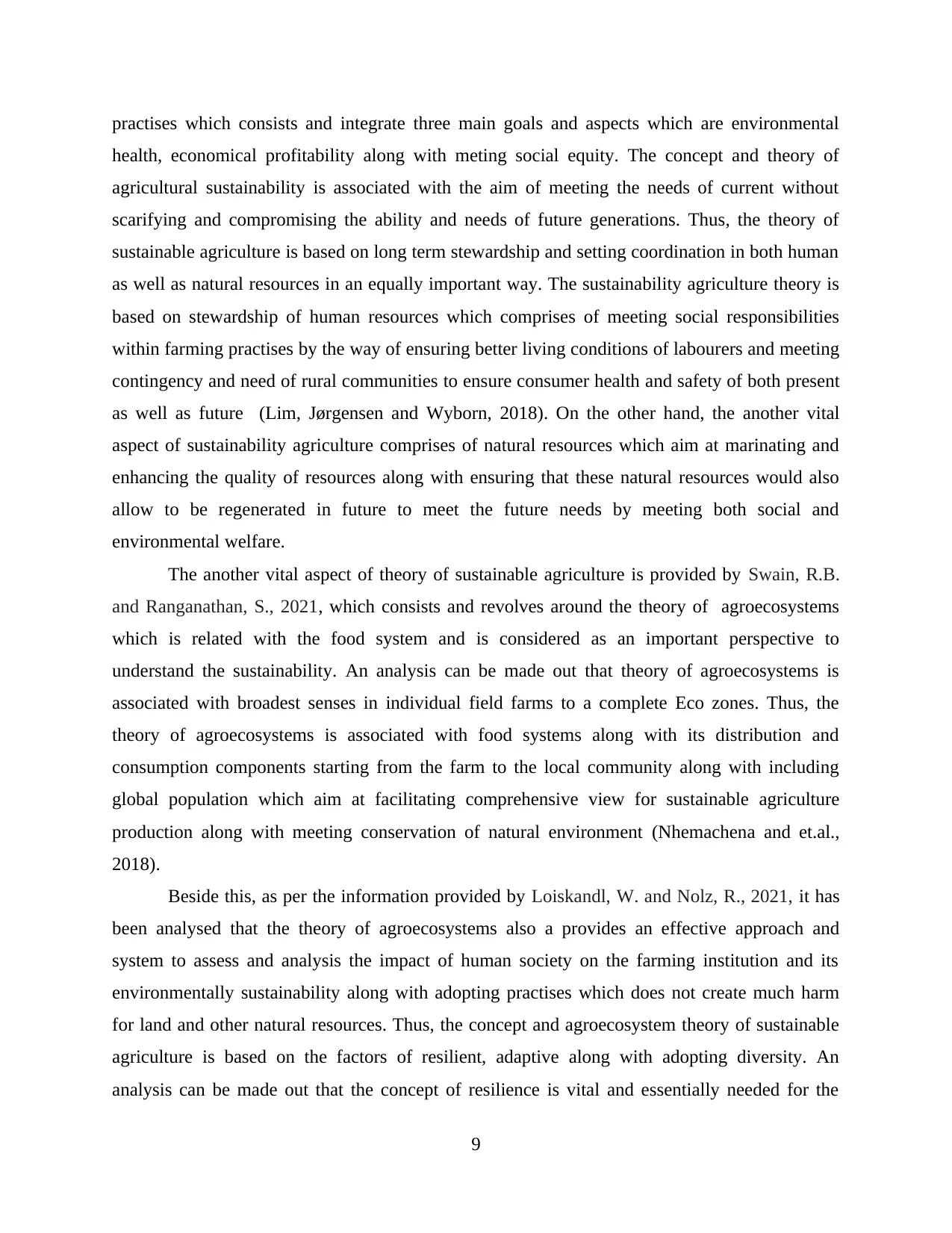
practises which consists and integrate three main goals and aspects which are environmental
health, economical profitability along with meting social equity. The concept and theory of
agricultural sustainability is associated with the aim of meeting the needs of current without
scarifying and compromising the ability and needs of future generations. Thus, the theory of
sustainable agriculture is based on long term stewardship and setting coordination in both human
as well as natural resources in an equally important way. The sustainability agriculture theory is
based on stewardship of human resources which comprises of meeting social responsibilities
within farming practises by the way of ensuring better living conditions of labourers and meeting
contingency and need of rural communities to ensure consumer health and safety of both present
as well as future (Lim, Jørgensen and Wyborn, 2018). On the other hand, the another vital
aspect of sustainability agriculture comprises of natural resources which aim at marinating and
enhancing the quality of resources along with ensuring that these natural resources would also
allow to be regenerated in future to meet the future needs by meeting both social and
environmental welfare.
The another vital aspect of theory of sustainable agriculture is provided by Swain, R.B.
and Ranganathan, S., 2021, which consists and revolves around the theory of agroecosystems
which is related with the food system and is considered as an important perspective to
understand the sustainability. An analysis can be made out that theory of agroecosystems is
associated with broadest senses in individual field farms to a complete Eco zones. Thus, the
theory of agroecosystems is associated with food systems along with its distribution and
consumption components starting from the farm to the local community along with including
global population which aim at facilitating comprehensive view for sustainable agriculture
production along with meeting conservation of natural environment (Nhemachena and et.al.,
2018).
Beside this, as per the information provided by Loiskandl, W. and Nolz, R., 2021, it has
been analysed that the theory of agroecosystems also a provides an effective approach and
system to assess and analysis the impact of human society on the farming institution and its
environmentally sustainability along with adopting practises which does not create much harm
for land and other natural resources. Thus, the concept and agroecosystem theory of sustainable
agriculture is based on the factors of resilient, adaptive along with adopting diversity. An
analysis can be made out that the concept of resilience is vital and essentially needed for the
9
health, economical profitability along with meting social equity. The concept and theory of
agricultural sustainability is associated with the aim of meeting the needs of current without
scarifying and compromising the ability and needs of future generations. Thus, the theory of
sustainable agriculture is based on long term stewardship and setting coordination in both human
as well as natural resources in an equally important way. The sustainability agriculture theory is
based on stewardship of human resources which comprises of meeting social responsibilities
within farming practises by the way of ensuring better living conditions of labourers and meeting
contingency and need of rural communities to ensure consumer health and safety of both present
as well as future (Lim, Jørgensen and Wyborn, 2018). On the other hand, the another vital
aspect of sustainability agriculture comprises of natural resources which aim at marinating and
enhancing the quality of resources along with ensuring that these natural resources would also
allow to be regenerated in future to meet the future needs by meeting both social and
environmental welfare.
The another vital aspect of theory of sustainable agriculture is provided by Swain, R.B.
and Ranganathan, S., 2021, which consists and revolves around the theory of agroecosystems
which is related with the food system and is considered as an important perspective to
understand the sustainability. An analysis can be made out that theory of agroecosystems is
associated with broadest senses in individual field farms to a complete Eco zones. Thus, the
theory of agroecosystems is associated with food systems along with its distribution and
consumption components starting from the farm to the local community along with including
global population which aim at facilitating comprehensive view for sustainable agriculture
production along with meeting conservation of natural environment (Nhemachena and et.al.,
2018).
Beside this, as per the information provided by Loiskandl, W. and Nolz, R., 2021, it has
been analysed that the theory of agroecosystems also a provides an effective approach and
system to assess and analysis the impact of human society on the farming institution and its
environmentally sustainability along with adopting practises which does not create much harm
for land and other natural resources. Thus, the concept and agroecosystem theory of sustainable
agriculture is based on the factors of resilient, adaptive along with adopting diversity. An
analysis can be made out that the concept of resilience is vital and essentially needed for the
9
⊘ This is a preview!⊘
Do you want full access?
Subscribe today to unlock all pages.

Trusted by 1+ million students worldwide
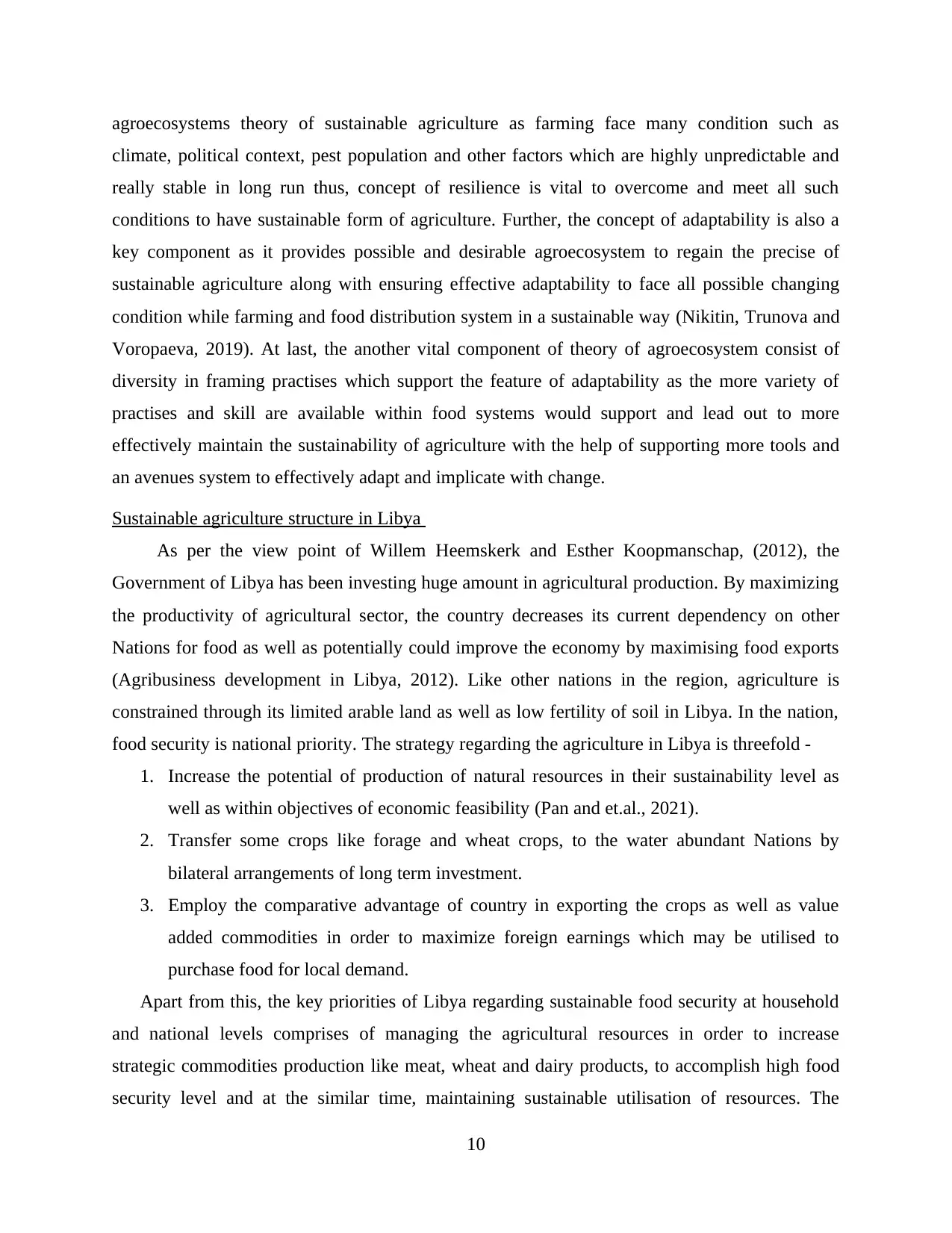
agroecosystems theory of sustainable agriculture as farming face many condition such as
climate, political context, pest population and other factors which are highly unpredictable and
really stable in long run thus, concept of resilience is vital to overcome and meet all such
conditions to have sustainable form of agriculture. Further, the concept of adaptability is also a
key component as it provides possible and desirable agroecosystem to regain the precise of
sustainable agriculture along with ensuring effective adaptability to face all possible changing
condition while farming and food distribution system in a sustainable way (Nikitin, Trunova and
Voropaeva, 2019). At last, the another vital component of theory of agroecosystem consist of
diversity in framing practises which support the feature of adaptability as the more variety of
practises and skill are available within food systems would support and lead out to more
effectively maintain the sustainability of agriculture with the help of supporting more tools and
an avenues system to effectively adapt and implicate with change.
Sustainable agriculture structure in Libya
As per the view point of Willem Heemskerk and Esther Koopmanschap, (2012), the
Government of Libya has been investing huge amount in agricultural production. By maximizing
the productivity of agricultural sector, the country decreases its current dependency on other
Nations for food as well as potentially could improve the economy by maximising food exports
(Agribusiness development in Libya, 2012). Like other nations in the region, agriculture is
constrained through its limited arable land as well as low fertility of soil in Libya. In the nation,
food security is national priority. The strategy regarding the agriculture in Libya is threefold -
1. Increase the potential of production of natural resources in their sustainability level as
well as within objectives of economic feasibility (Pan and et.al., 2021).
2. Transfer some crops like forage and wheat crops, to the water abundant Nations by
bilateral arrangements of long term investment.
3. Employ the comparative advantage of country in exporting the crops as well as value
added commodities in order to maximize foreign earnings which may be utilised to
purchase food for local demand.
Apart from this, the key priorities of Libya regarding sustainable food security at household
and national levels comprises of managing the agricultural resources in order to increase
strategic commodities production like meat, wheat and dairy products, to accomplish high food
security level and at the similar time, maintaining sustainable utilisation of resources. The
10
climate, political context, pest population and other factors which are highly unpredictable and
really stable in long run thus, concept of resilience is vital to overcome and meet all such
conditions to have sustainable form of agriculture. Further, the concept of adaptability is also a
key component as it provides possible and desirable agroecosystem to regain the precise of
sustainable agriculture along with ensuring effective adaptability to face all possible changing
condition while farming and food distribution system in a sustainable way (Nikitin, Trunova and
Voropaeva, 2019). At last, the another vital component of theory of agroecosystem consist of
diversity in framing practises which support the feature of adaptability as the more variety of
practises and skill are available within food systems would support and lead out to more
effectively maintain the sustainability of agriculture with the help of supporting more tools and
an avenues system to effectively adapt and implicate with change.
Sustainable agriculture structure in Libya
As per the view point of Willem Heemskerk and Esther Koopmanschap, (2012), the
Government of Libya has been investing huge amount in agricultural production. By maximizing
the productivity of agricultural sector, the country decreases its current dependency on other
Nations for food as well as potentially could improve the economy by maximising food exports
(Agribusiness development in Libya, 2012). Like other nations in the region, agriculture is
constrained through its limited arable land as well as low fertility of soil in Libya. In the nation,
food security is national priority. The strategy regarding the agriculture in Libya is threefold -
1. Increase the potential of production of natural resources in their sustainability level as
well as within objectives of economic feasibility (Pan and et.al., 2021).
2. Transfer some crops like forage and wheat crops, to the water abundant Nations by
bilateral arrangements of long term investment.
3. Employ the comparative advantage of country in exporting the crops as well as value
added commodities in order to maximize foreign earnings which may be utilised to
purchase food for local demand.
Apart from this, the key priorities of Libya regarding sustainable food security at household
and national levels comprises of managing the agricultural resources in order to increase
strategic commodities production like meat, wheat and dairy products, to accomplish high food
security level and at the similar time, maintaining sustainable utilisation of resources. The
10
Paraphrase This Document
Need a fresh take? Get an instant paraphrase of this document with our AI Paraphraser
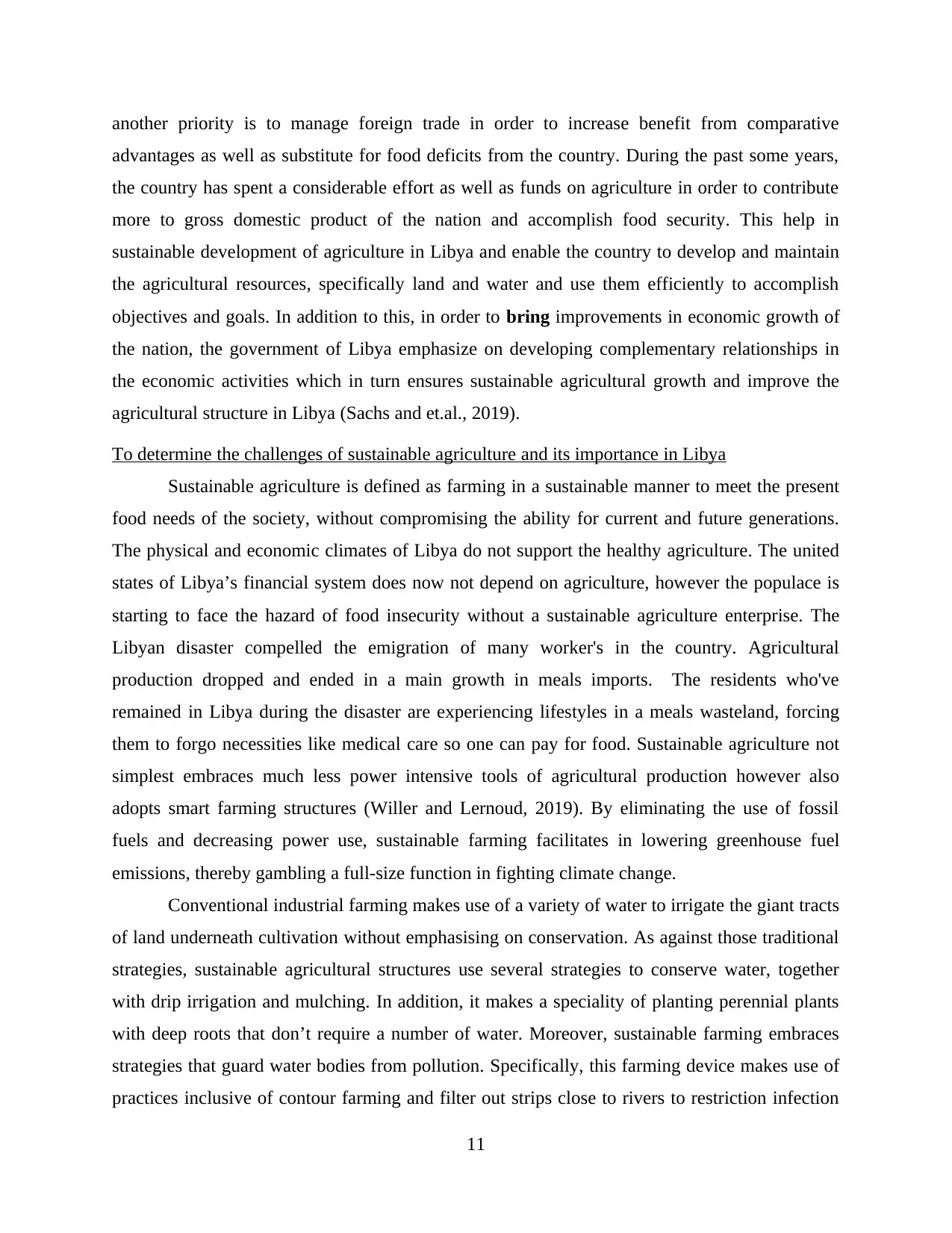
another priority is to manage foreign trade in order to increase benefit from comparative
advantages as well as substitute for food deficits from the country. During the past some years,
the country has spent a considerable effort as well as funds on agriculture in order to contribute
more to gross domestic product of the nation and accomplish food security. This help in
sustainable development of agriculture in Libya and enable the country to develop and maintain
the agricultural resources, specifically land and water and use them efficiently to accomplish
objectives and goals. In addition to this, in order to bring improvements in economic growth of
the nation, the government of Libya emphasize on developing complementary relationships in
the economic activities which in turn ensures sustainable agricultural growth and improve the
agricultural structure in Libya (Sachs and et.al., 2019).
To determine the challenges of sustainable agriculture and its importance in Libya
Sustainable agriculture is defined as farming in a sustainable manner to meet the present
food needs of the society, without compromising the ability for current and future generations.
The physical and economic climates of Libya do not support the healthy agriculture. The united
states of Libya’s financial system does now not depend on agriculture, however the populace is
starting to face the hazard of food insecurity without a sustainable agriculture enterprise. The
Libyan disaster compelled the emigration of many worker's in the country. Agricultural
production dropped and ended in a main growth in meals imports. The residents who've
remained in Libya during the disaster are experiencing lifestyles in a meals wasteland, forcing
them to forgo necessities like medical care so one can pay for food. Sustainable agriculture not
simplest embraces much less power intensive tools of agricultural production however also
adopts smart farming structures (Willer and Lernoud, 2019). By eliminating the use of fossil
fuels and decreasing power use, sustainable farming facilitates in lowering greenhouse fuel
emissions, thereby gambling a full-size function in fighting climate change.
Conventional industrial farming makes use of a variety of water to irrigate the giant tracts
of land underneath cultivation without emphasising on conservation. As against those traditional
strategies, sustainable agricultural structures use several strategies to conserve water, together
with drip irrigation and mulching. In addition, it makes a speciality of planting perennial plants
with deep roots that don’t require a number of water. Moreover, sustainable farming embraces
strategies that guard water bodies from pollution. Specifically, this farming device makes use of
practices inclusive of contour farming and filter out strips close to rivers to restriction infection
11
advantages as well as substitute for food deficits from the country. During the past some years,
the country has spent a considerable effort as well as funds on agriculture in order to contribute
more to gross domestic product of the nation and accomplish food security. This help in
sustainable development of agriculture in Libya and enable the country to develop and maintain
the agricultural resources, specifically land and water and use them efficiently to accomplish
objectives and goals. In addition to this, in order to bring improvements in economic growth of
the nation, the government of Libya emphasize on developing complementary relationships in
the economic activities which in turn ensures sustainable agricultural growth and improve the
agricultural structure in Libya (Sachs and et.al., 2019).
To determine the challenges of sustainable agriculture and its importance in Libya
Sustainable agriculture is defined as farming in a sustainable manner to meet the present
food needs of the society, without compromising the ability for current and future generations.
The physical and economic climates of Libya do not support the healthy agriculture. The united
states of Libya’s financial system does now not depend on agriculture, however the populace is
starting to face the hazard of food insecurity without a sustainable agriculture enterprise. The
Libyan disaster compelled the emigration of many worker's in the country. Agricultural
production dropped and ended in a main growth in meals imports. The residents who've
remained in Libya during the disaster are experiencing lifestyles in a meals wasteland, forcing
them to forgo necessities like medical care so one can pay for food. Sustainable agriculture not
simplest embraces much less power intensive tools of agricultural production however also
adopts smart farming structures (Willer and Lernoud, 2019). By eliminating the use of fossil
fuels and decreasing power use, sustainable farming facilitates in lowering greenhouse fuel
emissions, thereby gambling a full-size function in fighting climate change.
Conventional industrial farming makes use of a variety of water to irrigate the giant tracts
of land underneath cultivation without emphasising on conservation. As against those traditional
strategies, sustainable agricultural structures use several strategies to conserve water, together
with drip irrigation and mulching. In addition, it makes a speciality of planting perennial plants
with deep roots that don’t require a number of water. Moreover, sustainable farming embraces
strategies that guard water bodies from pollution. Specifically, this farming device makes use of
practices inclusive of contour farming and filter out strips close to rivers to restriction infection
11
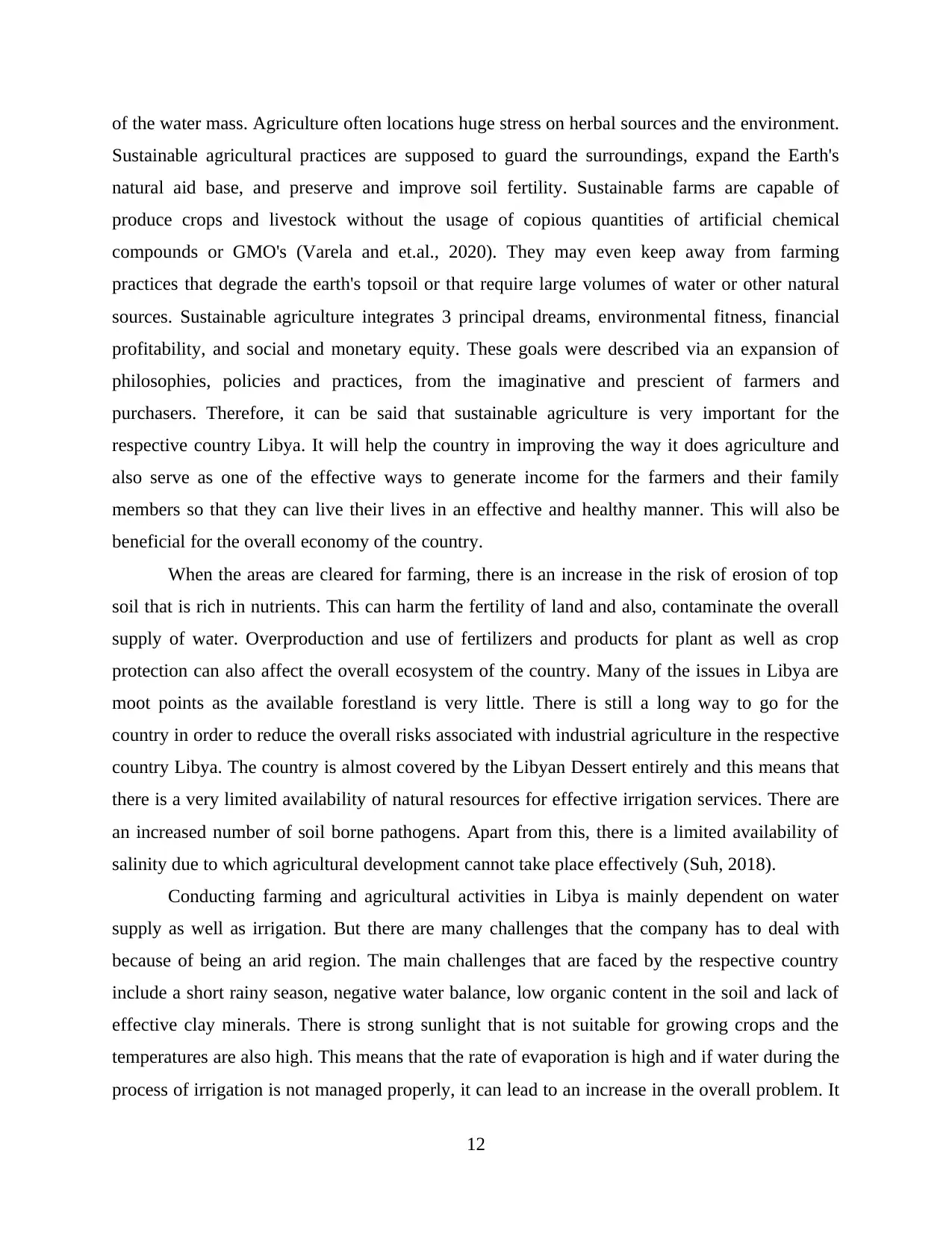
of the water mass. Agriculture often locations huge stress on herbal sources and the environment.
Sustainable agricultural practices are supposed to guard the surroundings, expand the Earth's
natural aid base, and preserve and improve soil fertility. Sustainable farms are capable of
produce crops and livestock without the usage of copious quantities of artificial chemical
compounds or GMO's (Varela and et.al., 2020). They may even keep away from farming
practices that degrade the earth's topsoil or that require large volumes of water or other natural
sources. Sustainable agriculture integrates 3 principal dreams, environmental fitness, financial
profitability, and social and monetary equity. These goals were described via an expansion of
philosophies, policies and practices, from the imaginative and prescient of farmers and
purchasers. Therefore, it can be said that sustainable agriculture is very important for the
respective country Libya. It will help the country in improving the way it does agriculture and
also serve as one of the effective ways to generate income for the farmers and their family
members so that they can live their lives in an effective and healthy manner. This will also be
beneficial for the overall economy of the country.
When the areas are cleared for farming, there is an increase in the risk of erosion of top
soil that is rich in nutrients. This can harm the fertility of land and also, contaminate the overall
supply of water. Overproduction and use of fertilizers and products for plant as well as crop
protection can also affect the overall ecosystem of the country. Many of the issues in Libya are
moot points as the available forestland is very little. There is still a long way to go for the
country in order to reduce the overall risks associated with industrial agriculture in the respective
country Libya. The country is almost covered by the Libyan Dessert entirely and this means that
there is a very limited availability of natural resources for effective irrigation services. There are
an increased number of soil borne pathogens. Apart from this, there is a limited availability of
salinity due to which agricultural development cannot take place effectively (Suh, 2018).
Conducting farming and agricultural activities in Libya is mainly dependent on water
supply as well as irrigation. But there are many challenges that the company has to deal with
because of being an arid region. The main challenges that are faced by the respective country
include a short rainy season, negative water balance, low organic content in the soil and lack of
effective clay minerals. There is strong sunlight that is not suitable for growing crops and the
temperatures are also high. This means that the rate of evaporation is high and if water during the
process of irrigation is not managed properly, it can lead to an increase in the overall problem. It
12
Sustainable agricultural practices are supposed to guard the surroundings, expand the Earth's
natural aid base, and preserve and improve soil fertility. Sustainable farms are capable of
produce crops and livestock without the usage of copious quantities of artificial chemical
compounds or GMO's (Varela and et.al., 2020). They may even keep away from farming
practices that degrade the earth's topsoil or that require large volumes of water or other natural
sources. Sustainable agriculture integrates 3 principal dreams, environmental fitness, financial
profitability, and social and monetary equity. These goals were described via an expansion of
philosophies, policies and practices, from the imaginative and prescient of farmers and
purchasers. Therefore, it can be said that sustainable agriculture is very important for the
respective country Libya. It will help the country in improving the way it does agriculture and
also serve as one of the effective ways to generate income for the farmers and their family
members so that they can live their lives in an effective and healthy manner. This will also be
beneficial for the overall economy of the country.
When the areas are cleared for farming, there is an increase in the risk of erosion of top
soil that is rich in nutrients. This can harm the fertility of land and also, contaminate the overall
supply of water. Overproduction and use of fertilizers and products for plant as well as crop
protection can also affect the overall ecosystem of the country. Many of the issues in Libya are
moot points as the available forestland is very little. There is still a long way to go for the
country in order to reduce the overall risks associated with industrial agriculture in the respective
country Libya. The country is almost covered by the Libyan Dessert entirely and this means that
there is a very limited availability of natural resources for effective irrigation services. There are
an increased number of soil borne pathogens. Apart from this, there is a limited availability of
salinity due to which agricultural development cannot take place effectively (Suh, 2018).
Conducting farming and agricultural activities in Libya is mainly dependent on water
supply as well as irrigation. But there are many challenges that the company has to deal with
because of being an arid region. The main challenges that are faced by the respective country
include a short rainy season, negative water balance, low organic content in the soil and lack of
effective clay minerals. There is strong sunlight that is not suitable for growing crops and the
temperatures are also high. This means that the rate of evaporation is high and if water during the
process of irrigation is not managed properly, it can lead to an increase in the overall problem. It
12
⊘ This is a preview!⊘
Do you want full access?
Subscribe today to unlock all pages.

Trusted by 1+ million students worldwide
1 out of 31
Related Documents
Your All-in-One AI-Powered Toolkit for Academic Success.
+13062052269
info@desklib.com
Available 24*7 on WhatsApp / Email
![[object Object]](/_next/static/media/star-bottom.7253800d.svg)
Unlock your academic potential
Copyright © 2020–2026 A2Z Services. All Rights Reserved. Developed and managed by ZUCOL.





